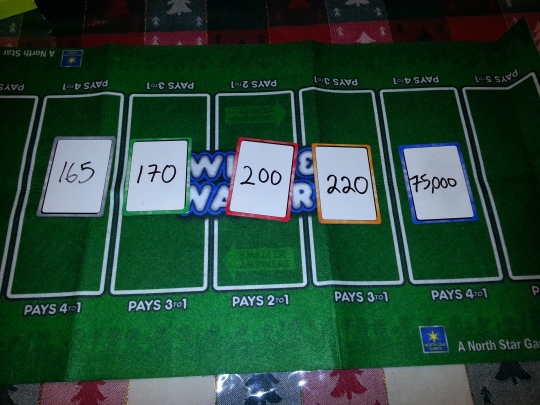I bought my boyfriend the game Wits and Wagers for Christmas, after seeing it on Tabletop and thinking he would enjoy it. (Feel free to watch the episode of Tabletop for a good example of how it works, though they play the Family edition, and we have the standard version.)
The basic premise of the game is that everyone is asked the same question, which always has a numerical answer (including dates). Everyone secretly writes down their guess, with the goal of being the closest without going over. Then, everyone reveals their answers and they are put in order on the board. At that point, everyone bets on which they think is the best answer. The answer is revealed, and the person who wrote the best answer and everyone who guessed it gets points.
I played it with him and some friends on New Year’s Eve, and saw some interesting results that made me think the game would be a good tool for developing number sense. In fact, one of his friends said that she wasn’t good at the game because she had no idea who was even a good range for an answer. But the game itself provides you with that sense, by consensus.
I know I read once, though I can’t remember where, about how when prompting a class for a guess, most student guesses will fall somewhere in the same order of magnitude as the first guess, even if that first guess is super ridiculous. (Like, for a guess at how tall the Eiffel Tower is, the first person guesses 6 miles. No, that can’t be right, the second person says. More like 4 miles.) The way to avoid this is to have people right down their answers ahead of time, a mechanic built into the game.
Sometimes that leads to interesting situations. One question asked how many episodes of Friends there had been, and this had been our responses:
This almost feels like a Math Mistakes question, where did this person go wrong in their guess? But comparing their sense of answer to the consensus helps us get an idea of what’s right, and what’s misinterpreted. (In this case, the person thought it was asking how many episodes have been shown on TV ever, like in syndication and whatnot, in which her answer then makes a lot of sense. So never dismiss an answer just because it seems so far off the mark. There’s always a reason!)
A lot of questions had a historical bent as well (years), so then can help build a sense of time as well. (As long as a rogue history teacher isn’t sitting nearby shouting out answers even though he isn’t playing the game.)
In the end, I think this game could go along with something like Estimation180 for building number sense, but in a more communal gaming way. If you talk to people about how they chose their numbers, we can get a sense of their mathematical thinking. And that’s worth a lot.

Leave a comment